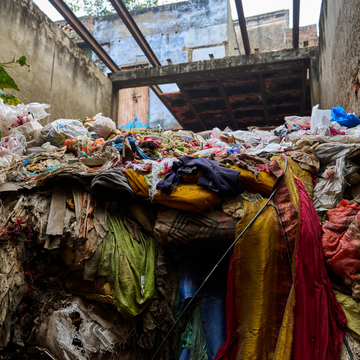For years, brands have sold bamboo and Tencel sheets as the eco-friendly, sustainable alternative to cotton. Words like “organic,” “plant-based,” and “green” are slapped across packaging, making people feel they’re making a better choice for the planet.
But here’s the uncomfortable truth: most bamboo and Tencel sheets are as far from sustainable as fast fashion. Not only are they chemically processed, but many can also irritate sensitive skin — the opposite of what good bedding should do.
🚨 The Chemical Reality of Bamboo & Tencel Sheets
Bamboo in its raw form cannot be spun into soft fabric. What you’re sleeping on is “bamboo viscose” or “rayon,” which is created through a harsh chemical process involving:
-
Sodium hydroxide (caustic soda, used in drain cleaner)
-
Carbon disulfide (linked to reproductive harm and nerve damage in workers)
-
Sulfuric acid (used to dissolve plant pulp)
These chemicals strip bamboo down into a pulp, which is then regenerated into fiber. The result? A fabric that is no longer bamboo, just chemically processed rayon.
Tencel (also known as lyocell) is marketed as slightly more eco-friendly, but it still relies on chemical solvents like N-methylmorpholine N-oxide. Yes, the process recycles some chemicals — but that doesn’t erase the fact that your “green” bedsheet was bathed in a cocktail of solvents before reaching your bed.
😬 Bad News for Your Skin
Many people switch to bamboo or Tencel thinking it’s better for sensitive skin. But here’s the catch:
-
Residual chemicals from rayon processing can remain in the fabric.
-
Lower-quality dyes often used in “eco” bedding brands can trigger eczema flare-ups and allergic reactions.
-
The moisture-retaining nature of rayon means your bed can become a breeding ground for bacteria and dust mites, worsening acne and skin irritation.
Dermatologists often recommend sticking to certified Egyptian cotton bedding because it’s naturally breathable, hypoallergenic, and doesn’t require such intense chemical processing. Here’s why dermatologists recommend Egyptian cotton bedding
🌍 The Greenwashing Problem
Fast fashion thrives on marketing over truth — and bamboo/Tencel bedding is no different.
-
Deforestation: Huge areas of land in Asia are cleared to grow bamboo for industrial purposes.
-
High energy use: The chemical processing plants that turn bamboo into rayon are energy-intensive.
-
Wastewater pollution: Toxic solvents often leak into waterways in producing countries, harming local communities.
Compare that to Egyptian cotton — a natural fiber that grows once, spins directly into fabric, and requires no chemical soup to turn into something soft. Plus, certified bedding brands like Katin Life, meet OEKO-TEX® standards, ensuring no harmful substances touch your skin.
🛏️ The Fast-Fashion of Bedding
Think of bamboo and Tencel sheets like cheap polyester fashion:
-
Marketed as sustainable but made through toxic, industrial processes.
-
Feels good at first, but doesn’t last long.
-
Often replaced quickly, feeding the cycle of overconsumption.
Egyptian cotton, on the other hand, is the timeless wardrobe piece of bedding. Stronger, softer with every wash, and safe for your skin — it’s the luxury investment that actually lasts.
✅ The Smarter Choice: Egyptian Cotton Bedding
At Katin Life, we only use 900 thread count Egyptian cotton, certified by OEKO-TEX®, meaning:
-
✅ Chemical-free
-
✅ Hypoallergenic and safe for sensitive skin
-
✅ Long-lasting luxury (no pilling, no fast-fashion feel)
If you care about your skin and the planet, stop falling for the “greenwashed” bamboo/Tencel narrative. True sustainability is about quality that lasts, not toxic quick fixes.
👉 Explore Malaysia’s highest-rated Egyptian cotton bedding today and feel the difference.
📲 Message us directly on WhatsApp
📌 Key Takeaway
Bamboo & Tencel sheets aren’t what they seem. Behind the eco-marketing lies a toxic, fast-fashion cycle that harms both your health and the environment. For true skin-friendly, sustainable sleep — choose Egyptian cotton.






